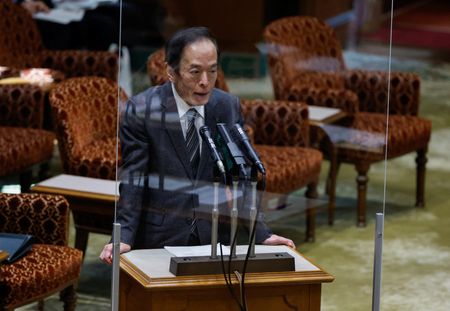 1
1 1
1

By Leika Kihara and Yoshifumi Takemoto
TOKYO (Reuters) – Japan’s lower house of parliament on Thursday approved the government’s nominees for next central bank governor and deputy governors, signing off on a new leadership that will be tasked with steering a smooth exit from ultra-loose monetary policy.
The upper house will vote on the nominations on Friday. Approval by the two chambers has been seen as a done deal as the ruling coalition holds majority seats in both houses.
With the approval, government nominee Kazuo Ueda will officially succeed incumbent BOJ Governor Haruhiko Kuroda whose second, five-year term ends on April 8.
The two deputy governor nominees, career central banker Shinichi Ueda and former banking regulator head Ryozo Himino, will take office from March 20 – succeeding Masayoshi Amamiya and Masazumi Wakatabe.
Ueda will chair his first policy meeting on April 27-28, when the board will produce closely-watched, fresh quarterly growth and price forecasts extending through fiscal 2025.
With inflation exceeding the BOJ’s target, Ueda faces the challenge of phasing out the bank’s controversial bond yield control policy, which has drawn public criticism for distorting market functions and crushing banks’ margins.
“It’s true there are various side-effects emerging from the stimulus. But the BOJ’s current policy is a necessary, appropriate means to achieve 2% inflation,” Ueda told parliament last month, signalling that he was in no rush to hike rates.
Ueda, however, said he did have ideas on how the BOJ could exit its massive stimulus, and was open to the idea of conducting a comprehensive review of its policy framework.
The BOJ’s fresh quarterly forecasts in April may offer clues on how the new board line-up sees the chance of inflation sustainably hitting its 2% target – a prerequisite for exiting ultra-low interest rates, analysts say.
In current projections made in January, the BOJ expects core consumer inflation to hit 3.0% in the current year ending in March, but slow to 1.6% in fiscal 2023 and hit 1.8% in 2024.
With market distortion caused by YCC showing few signs of letting up, a majority of economists polled by Reuters expect the BOJ to end its yield curve control (YCC) policy this year. Half of them said Ueda will tweak YCC within three months, such as by widening the band set around its 10-year yield target.
Already, Ueda is facing pressure from the ruling party’s powerful faction once led by deceased former premier Shinzo Abe, which is against attempts to roll back the pro-growth policies of “Abenomics” including Kuroda’s big monetary stimulus.
Ruling party heavyweight Hiroshige Seko, who belongs to the camp, grilled Ueda in parliament last month on whether he would carry over the policies pursued under Abenomics.
“I’ll succeed the policy in the context of seeking to hit the BOJ’s 2% inflation stably and sustainably,” Ueda replied.
Hiroshi Shiratori, a professor at Japan’s Hosei University, see the appointment of Ueda as a sign Kishida wants the BOJ to phase out the legacy policy of Abenomics.
“Ueda is saying the BOJ will maintain low rates for now. But at some point in the future, the BOJ will change policy.”
(Reporting by Leika Kihara and Yoshifumi Takemoto; Editing by Sam Holmes)